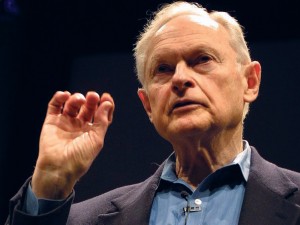At 7:30 PM one Tuesday evening, I received a call. “Hello Kevin, this is Dr. Nuland. I wanted to tell you, I just finished reading your term paper, and it is absolutely wonderful! I wanted to call at the height of my excitement and ask for your permission to share it with a few of my colleagues.” I was at a loss for words. Only three hours after I had submitted my paper, Sherwin Nuland, a National Book Award-winning author and renowned surgeon, had called me, a measly college freshman, to tell me that he enjoyed reading my essay.

Three months later, Dr. Nuland died. That Tuesday night phone call is the last conversation I will ever have with him. I had only just become acquainted with someone I knew I could trust as my close mentor and friend, and he was suddenly gone. The image of him seated across from me in our classroom and the sound of his weighty voice weaving out stories of medical history were still so vivid in my mind, as if I had been in his presence only yesterday.
Dr. Nuland passed away in his home in Hamden, Connecticut on March 3, 2014 after a battle with prostate cancer. In his enriched and fulfilling 83 years of life, he practiced surgery for 30 years before retiring to write books like How We Die, a national bestseller that demystified the true nature and process of death. This book received the National Book Award in 1994. Dr. Nuland also taught the Yale College freshman seminar “History of Scientific Medicine,” through which I came to know him.
On the first day of class, Dr. Nuland told us one rule: “You can interrupt me all you want, but you must not interrupt each other.” For him, teaching was not a one-directional stream of information from authority to pupil but rather collaboration between equal minds united in the quest for truth. He advised us to be grateful and humble every day, constantly reminding us, “For each one of you Yalies, there are two others who could do the same work and who have the same qualifications, but who were not accepted here.”
Dr. Nuland was an excellent storyteller. He related to me the pride of Galen, the empathy of Ambroise Parè, and the misery of Semmelweis. He also recounted the way he would run from the Yale-New Haven Hospital to the Yale Medical Historical Library in between surgery shifts to write his books. And as we learned about the lives of the medical greats, he emphasized the importance of writing things down, an act that often determined whether or not a figure would have a place in history bibliotheca.
Dr. Nuland’s love for the English language emanated through his speech as much as it did through his passion for writing and storytelling. He taught me the importance of understanding the nature and necessity of every spoken word. He caught me using the word “like” in the middle of my sentences, and asked what I meant by “William Harvey discovered ‘like’ circulation of the blood.” He spoke deliberately, making sure his every word was genuine and true to its meaning.
One of Dr. Nuland’s most valuable lessons came as he was praising the vision of physician-statesman Rudolf Virchow. He said, “For as long as you live, even when you’re 80 years old, always stay dissatisfied with the status quo.” For Dr. Nuland, this meant teaching a freshman the history of medicine, advocating for bioethics, and writing books to share his knowledge and wisdom. For him, sitting by the fireplace and watching the world go by was never an option, even 20 years into his retirement.
From spending a semester with him, all I saw in Dr. Nuland was kindness, knowledge, and strength. Occasionally, I would catch glimpses of his extraordinary fortitude — he would best the stairs of Harkness Hall rather than submitting to the comfort of the elevator, refuse to let me help him carry his bag, and climb the stairs with a piercing determination in his eyes.
What I didn’t know about Dr. Nuland was that his strength and kindness emerged from his experiences with the worst of the human condition. It was not until after his death that I learned of his painful, tormenting childhood, the many crosses of guilt and shame he bore throughout his life, and his struggle against depression and suicide.
The 12 weeks of class I had with Dr. Nuland were indeed an experience that left me wishing for more time with him. But as he once said, “It is death that drives evolution.” For Dr. Nuland, death marked a beginning, and as one of the last students he ever taught, I caught a glimpse of his legacy — a passion that inspired thousands in the past and will inspire many more to come.
Click here to watch Dr. Nuland’s TED talk: https://www.ted.com/talks/sherwin_nuland_on_electroshock_therapy
